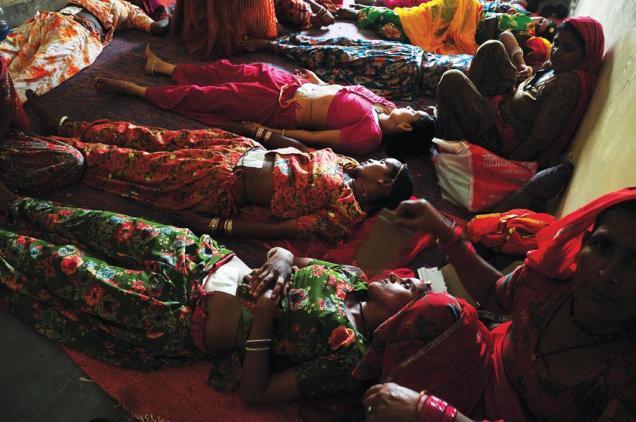Population Control Quotas and Aid Denial

The overpopulation myth that was started by Thomas Malthus in the eighteenth century was and is still promoted by powerful advocates and organizations to the present day. Although overpopulation was not true then and is not true today, it has been used to justify inhumane treatment of people in poor nations in the form of quotas on forced sterilizations and other involuntary population control measures as a condition for receiving foreign aid, including needed food aid during famines. In reality, it should be called elimination of the poor, since only the poor are targeted. Poverty, not overpopulation, is the problem, and that can be remedied by education, investment and job opportunities along with disease control, proper medical care, electricity and roads.
Here are a few important quotes from some of the promoters of this anti-human population control ideology.
In The Population Bomb, Paul Ehrlich said,
“A cancer is an uncontrolled multiplication of cells; the population explosion is an uncontrolled multiplication of people … we must shift our efforts from the treatment of the symptoms to the cutting out of the cancer. The operation will demand many apparently brutal and heartless decisions.”[1]
In a New York Times article, Ehrlich is quoted as saying “. . . A possibility that the government might have to put sterility drugs in reservoirs and in food shipped to foreign countries to limit human multiplication.” was envisioned today by a leading crusader on the population problem.[2]
Maurice Strong, founder and first director of UN Environment Programme (UNEP), co-founder of WWF, Secretary-General of the UN Conference on Human Environment in Stockholm (1972), the Rio Sustainable Development Summit (1992) and ex World Bank advisor, is quoted as saying, “Licenses to have babies incidentally is something that got in trouble some years ago for suggesting even in Canada that this might be necessary at some point, at least some restriction on the right to have a child.”[3]
He also said “Frankly, we may get to the point where the only way of saving the world will be for industrial civilization to collapse. Isn’t it our responsibility to bring it about?”[4]
Prince Phillip, Duke of Edinburgh, is quoted as saying “In the event that I am reborn, I would like to return as a deadly virus, in order to contribute something to solve overpopulation.“[5]
Jacques Cousteau is quoted as saying, “World population must be stabilized and to do that we must eliminate 350,000 people per day.”[6]
|
POPULATION CONTROL IN INDIA |
|
| Total fertility Rate:1970 | 5.5 |
| Total fertilityRate:2015 | 2.5 |
| Population growth rate | 1.2% |
| Women sterilized: total | 30% |
| Women sterilized: married | 37% |
| Women sterilized: unmarried, sexually active | 48% |
| Women sterilized: informed about other contraceptive methods | 28% |
| Women sterilized: informed procedure was permanent | 66% |
| Men sterilized | 1% |
| Sex-ratio at birth (males: females) | 112:100 |
Source: Data compiled from the UN Population Division and the Demographic and Health Survey. Population Research Institute at http://www.pop.org

[1] Paul Ehrlich, 1968
[2] Gladwin Hillspecial, “A Sterility Drug In Food Is Hinted; Biologist Stresses Need To Curb Population Growth,” New York Times, November 24, 1969, https://www.nytimes.com/1969/11/25/archives/a-sterility-drug-in-food-is-hinted-biologist-stresses-need-to-curb.html. See also Paul Ehrlich and John Holdren, Ecoscience: Population, Resources, Environment (New York: W.H. Freeman & Co, 1977).
[3] Maurice Strong, occasion uncertain, but widely quoted.
[4] Maurice Strong, in opening remarks, UN Sustainable Development Summit, Rio de Janeiro, 1992.
[5] Prince Phillip, Duke of Edinburgh of England, 1988, from Cawthorne, Nigel, 2015, I know I am rude, but it’s Fun: The Royal Family and the World at Large – as Seen by Prince Philip
[6] Cousteau, Jacques, “Interview with Jacques-Yves Cousteau,” The UNESCO Courier, November 1991, 13.